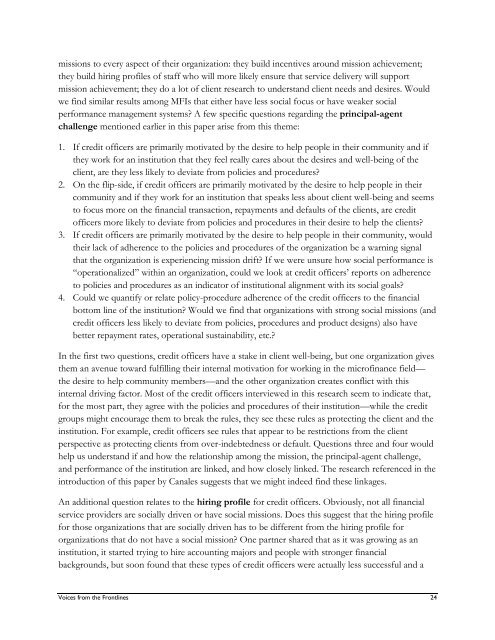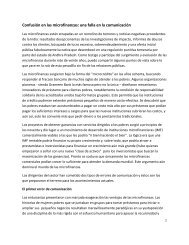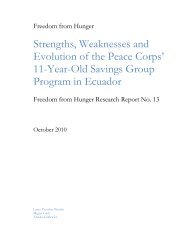Voices from the Frontlines: - Freedom from Hunger
Voices from the Frontlines: - Freedom from Hunger
Voices from the Frontlines: - Freedom from Hunger
Create successful ePaper yourself
Turn your PDF publications into a flip-book with our unique Google optimized e-Paper software.
missions to every aspect of <strong>the</strong>ir organization: <strong>the</strong>y build incentives around mission achievement;<br />
<strong>the</strong>y build hiring profiles of staff who will more likely ensure that service delivery will support<br />
mission achievement; <strong>the</strong>y do a lot of client research to understand client needs and desires. Would<br />
we find similar results among MFIs that ei<strong>the</strong>r have less social focus or have weaker social<br />
performance management systems? A few specific questions regarding <strong>the</strong> principal-agent<br />
challenge mentioned earlier in this paper arise <strong>from</strong> this <strong>the</strong>me:<br />
1. If credit officers are primarily motivated by <strong>the</strong> desire to help people in <strong>the</strong>ir community and if<br />
<strong>the</strong>y work for an institution that <strong>the</strong>y feel really cares about <strong>the</strong> desires and well-being of <strong>the</strong><br />
client, are <strong>the</strong>y less likely to deviate <strong>from</strong> policies and procedures?<br />
2. On <strong>the</strong> flip-side, if credit officers are primarily motivated by <strong>the</strong> desire to help people in <strong>the</strong>ir<br />
community and if <strong>the</strong>y work for an institution that speaks less about client well-being and seems<br />
to focus more on <strong>the</strong> financial transaction, repayments and defaults of <strong>the</strong> clients, are credit<br />
officers more likely to deviate <strong>from</strong> policies and procedures in <strong>the</strong>ir desire to help <strong>the</strong> clients?<br />
3. If credit officers are primarily motivated by <strong>the</strong> desire to help people in <strong>the</strong>ir community, would<br />
<strong>the</strong>ir lack of adherence to <strong>the</strong> policies and procedures of <strong>the</strong> organization be a warning signal<br />
that <strong>the</strong> organization is experiencing mission drift? If we were unsure how social performance is<br />
“operationalized” within an organization, could we look at credit officers’ reports on adherence<br />
to policies and procedures as an indicator of institutional alignment with its social goals?<br />
4. Could we quantify or relate policy-procedure adherence of <strong>the</strong> credit officers to <strong>the</strong> financial<br />
bottom line of <strong>the</strong> institution? Would we find that organizations with strong social missions (and<br />
credit officers less likely to deviate <strong>from</strong> policies, procedures and product designs) also have<br />
better repayment rates, operational sustainability, etc.?<br />
In <strong>the</strong> first two questions, credit officers have a stake in client well-being, but one organization gives<br />
<strong>the</strong>m an avenue toward fulfilling <strong>the</strong>ir internal motivation for working in <strong>the</strong> microfinance field—<br />
<strong>the</strong> desire to help community members—and <strong>the</strong> o<strong>the</strong>r organization creates conflict with this<br />
internal driving factor. Most of <strong>the</strong> credit officers interviewed in this research seem to indicate that,<br />
for <strong>the</strong> most part, <strong>the</strong>y agree with <strong>the</strong> policies and procedures of <strong>the</strong>ir institution—while <strong>the</strong> credit<br />
groups might encourage <strong>the</strong>m to break <strong>the</strong> rules, <strong>the</strong>y see <strong>the</strong>se rules as protecting <strong>the</strong> client and <strong>the</strong><br />
institution. For example, credit officers see rules that appear to be restrictions <strong>from</strong> <strong>the</strong> client<br />
perspective as protecting clients <strong>from</strong> over-indebtedness or default. Questions three and four would<br />
help us understand if and how <strong>the</strong> relationship among <strong>the</strong> mission, <strong>the</strong> principal-agent challenge,<br />
and performance of <strong>the</strong> institution are linked, and how closely linked. The research referenced in <strong>the</strong><br />
introduction of this paper by Canales suggests that we might indeed find <strong>the</strong>se linkages.<br />
An additional question relates to <strong>the</strong> hiring profile for credit officers. Obviously, not all financial<br />
service providers are socially driven or have social missions. Does this suggest that <strong>the</strong> hiring profile<br />
for those organizations that are socially driven has to be different <strong>from</strong> <strong>the</strong> hiring profile for<br />
organizations that do not have a social mission? One partner shared that as it was growing as an<br />
institution, it started trying to hire accounting majors and people with stronger financial<br />
backgrounds, but soon found that <strong>the</strong>se types of credit officers were actually less successful and a<br />
<strong>Voices</strong> <strong>from</strong> <strong>the</strong> <strong>Frontlines</strong> 24















